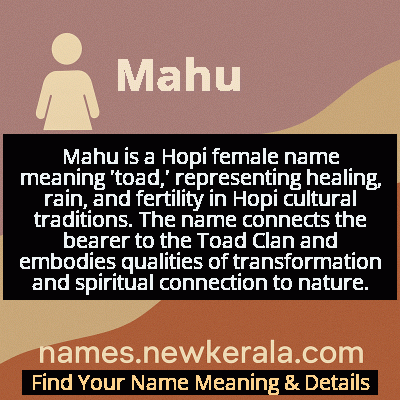Mahu Name Meaning & Details
Origin, Popularity, Numerology Analysis & Name Meaning of Mahu
Discover the origin, meaning, and cultural significance of the name MAHU. Delve into its historical roots and explore the lasting impact it has had on communities and traditions.
Name
Mahu
Gender
Female
Origin
Native
Lucky Number
7
Meaning of the Name - Mahu
Mahu is a Hopi female name meaning 'toad,' representing healing, rain, and fertility in Hopi cultural traditions. The name connects the bearer to the Toad Clan and embodies qualities of transformation and spiritual connection to nature.
Mahu - Complete Numerology Analysis
Your Numerology Number
Based on Pythagorean Numerology System
Ruling Planet
Neptune (Ketu)
Positive Nature
Intuitive, analytical, spiritual, and inquisitive.
Negative Traits
Secretive, reserved, aloof, and can be overly critical.
Lucky Colours
Green, yellow.
Lucky Days
Monday.
Lucky Stones
Cat’s eye, moonstone.
Harmony Numbers
1, 5, 6.
Best Suited Professions
Scientists, researchers, spiritual leaders, detectives.
What People Like About You
Depth of knowledge, analytical skills, spirituality.
Famous People Named Mahu
Mahu Mana
Hopi Potter
Renowned for creating distinctive polychrome pottery with traditional Hopi designs
Mahu Kachina
Cultural Educator
Preserved and taught traditional Hopi stories and ceremonies to younger generations
Mahu Tawa
Weaver
Master weaver known for intricate Hopi textiles and baskets
Name Variations & International Equivalents
Click on blue names to explore their detailed meanings. Gray names with will be available soon.
Cultural & Historical Significance
The cultural significance extends beyond mere naming to encompass entire systems of knowledge preservation. As Hopi society operates through matrilineal clans, names like Mahu help maintain social structure and cultural continuity. The name serves as a living link to Hopi creation stories and the migration narratives that define Hopi identity. In contemporary contexts, carrying such a name represents both cultural pride and responsibility toward preserving indigenous knowledge systems against centuries of colonization and cultural erosion.
Extended Personality Analysis
Women named Mahu are often characterized by their deep connection to traditional values and natural wisdom. They typically exhibit qualities of patience, observation, and quiet strength, much like their namesake animal that waits patiently for rain. Their personality reflects the toad's symbolic attributes of transformation and adaptability - able to navigate different environments while maintaining core cultural identity. They often serve as community anchors, providing stability and healing knowledge during challenging times.
These individuals tend to be practical problem-solvers with strong intuitive abilities, drawing on both ancestral knowledge and personal experience. Their grounded nature makes them excellent caretakers and cultural preservers, often taking on roles that ensure community wellbeing and intergenerational knowledge transfer. While they may appear reserved initially, they possess deep emotional intelligence and the ability to read situations with remarkable accuracy. Their strength lies in their consistency and reliability, making them trusted members of their communities who embody the enduring spirit of Hopi cultural values.
Modern Usage & Popularity
In modern contexts, Mahu remains predominantly used within Hopi communities as part of ongoing cultural preservation efforts. While not commonly found in mainstream naming databases or popularity charts, the name maintains consistent usage among families committed to sustaining Hopi language and traditions. There has been a modest increase in recognition as part of broader indigenous rights movements and cultural revitalization initiatives. However, its usage outside Hopi communities remains limited due to appropriate cultural respect and the name's specific spiritual connotations. The name represents a conscious choice to maintain cultural identity in the face of assimilation pressures, serving as both personal identifier and political statement about indigenous sovereignty and cultural continuity.
Symbolic & Spiritual Meanings
Symbolically, Mahu embodies the profound interconnectedness between humans and the natural world that characterizes Hopi worldview. The toad represents transformation and mediation between different states of being - from tadpole to adult, from water creature to land dweller. This symbolizes personal growth, spiritual evolution, and the ability to navigate multiple cultural contexts while maintaining core identity. The name carries meanings of purification and renewal, as toads are intimately connected with rain and water cycles essential for life in the desert.
Metaphorically, Mahu signifies the importance of seemingly small or humble beings in maintaining ecological and spiritual balance. It teaches that true power often lies in quiet observation and patient waiting rather than aggressive action. The name also represents fertility and abundance, linking to agricultural cycles and community prosperity. In a broader sense, it symbolizes cultural resilience - the ability to adapt while preserving essential traditions, much like the toad that survives in harsh environments through remarkable adaptability and ancient wisdom.

